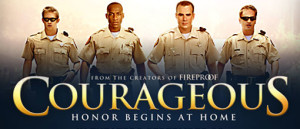The latest, and most watchable of the Sherwood Baptist’s movies, revolves around men desiring to be better fathers. It’s not a great film, but it does contain all the “Jesus-porn” you’d expect, along with some truly funny gags, workman-like action scenes and a strong dose of ham-fisted family drama.
 As such, it illustrates several important screenwriting lessons. I hope the Kendrick brothers will take note:
As such, it illustrates several important screenwriting lessons. I hope the Kendrick brothers will take note:
Differentiate your characters
The trope of the new cop on the job is designed to create interpersonal conflict. It is a collision of old and new that is typically augmented as safe vs. insane (Lethal Weapon) or the By-the-book vs. By the heart (Witness) or by-the-street (48 hours, Beverly Hills Cop), or some other combination.
But new cop Nathan is the SAME character as the others. Our hero Adam is a responsible cop who wants to be a better father. Nathan is a responsible black cop who wants to be a better father. Javier is the responsible Latino worker who wants to be a better provider. The differences are too minute to create sufficient interpersonal conflict.
That is one reason why too many scenes have NO true conflict.
Establish an Essential Question that creates narrative drive
When Nathan fights the gang leader/drug dealer/carjacker villain in act 1, scene 1, for control of his car, it establishes Nathan’s character and his primary motivation: he’ll do anything to protect his kids. It’s a strong scene, but it is also misleading. The audience assumes that the essential conflict of the story is: will the cops stop the villain? How far will the cops go to protect their children from harm?
But roughly 96% of the movie is focused on other things. We spend too much time introducing buddies, having a cook-out, building a shed… Then with the child’s death, the audience assumes, “Finally! Back on track. The villain or henchman killed the girl in a carjacking and now the cop’ll redouble their efforts to…”
Nope. Killed by a random drunk driver.
Then the story then veers widely into melodrama as the family mourns the loss, and instead of the cops knuckling down on mid-afternoon drunk drivers, our “good enough” father decides that’s not good enough. He takes 6 weeks off to come up with a Super Dad Resolution, which establishes the film’s true essential question: Will the fathers become better fathers?
That doesn’t give us much narrative drive. Stopping a gang from assuming a fatherhood role over the city’s children is merely important. Capturing rabid carjackers creates immediacy. Stopping kidnappers creates immediacy, dread and a ticking clock. Getting better at being dad is not only hard to qualify but it doesn’t create momentum in the story.
Establish a clear, strong character Arc
The other obvious problem is: How do you define “better”? How can you determine whether they actually arc? That is, will this resolution take, or will they fall back into “better-than-most” dad after an exhausting time playing super-dad?
In any script, the hero has the potential to arc in 3 ways: tactically, psychologically, and morally. The moral arc requires not only a change in behavior (tactic) or an overcoming is mental block (psychological), but a fundamental change in worldview, how the hero relates to his world and others. The moral arc is the most satisfying to the audience.
At the beginning, our hero Adam loves his kids but won’t run a 5K race with his son. He doesn’t believe he can run a 5K and wonders if there’s an easier way to connect. At the end, he’s overcome his psychological block to running, uses running with his son as his tactic to engage with his son, but his love for his son hasn’t changed.
Yes, his worldview is taken up a notch, but it’s not fundamentally different. He’s still the same good-hearted, church-going, stake-grilling civil servant who says “love you” at the end of phone calls.
Consider Adam’s arc in relation to Nathan. At the beginning Adam wonders if he could fight a villain to save his child as Nathan did. Unfortunately for us storytellers, the answer is YES. If the end battle had taken place at the beginning, his actions and the results would be the same. That’s a problem.
By the same token, Nathan’s preservation of his family through the Resolution is a tactic, but his arc is neither psychological, nor moral.
Create a unified narrative
Courageous’ main problem is that it is episodic. A strong essential question creates a strong spine (AKA Throughline) for your story. Weak essential questions and spines mean the writer runs out of material after writing the setup (act 1) and payoff (act 3), so act 2 gets filled with extra characters, subplots, themes and random material to keep the audience awake.
In Courageous, it’s hard to tell which material is essential. If “becoming a better father” is our spine, then our carjacking drug lord villain is “audience-candy” but it’s not essential. If “catching the villain” is our spine, then the 5K is potentially filler. Either way, Javier is an unnecessary subplot, as is building the shed, and the death of Adam’s daughter (which I also found emotionally manipulative).
How to Fix Courageous
1. In the premise, take out “and” and use “through.” That is, instead of:
Fathers try to become better fathers after the death of a child, AND hunt a criminal.
The premise should be:
Cops become better fathers THROUGH hunting a criminal preying on children.
Adam’s daughter should be killed by the villain in retaliation for the botched carjacking. The Chief should not read an email about the absence of fathers – it should be apparent (pun intended) from the investigation that there is a consistent lack of fathers in arrested gang members’ lives. This will ignite their inner journey toward being better fathers. Javier should be a witness or potential suspect in the case, not a random guy with the same name as a sick carpenter needed to help build a shed.
Another way to look at it, an external story line like capturing the drug lord is the A plot. Moral improvement stuff like being a better father belongs in the B plot, the inner journey of the character.
2. Find a MacGuffin. A MacGuffin is the inanimate object that drives plot into motion. In North by Northwest, it’s the microfilm. In LA Confidential, it’s the missing heroin. In Courageous, perhaps it’s an empty car seat, hinting that the criminals have stolen a child. This creates a clear, immediate desire for the cops, a strong essential question, and a potential ticking clock.
3. Create larger character contrasts to create interpersonal conflict, not just racial equity in casting. See above. And along with that, Javier’s wife is a stereotypical 1-note nag. Can we get by without those scenes?
4. Stop the sketch comedy. Yes, the “mistaken Javier” and “Snake King” scenes are hilarious, but they halt the narrative drive because they’re not related to the plot and they don’t define character. Comedy should come out of character under stress, in the path of the story.
For example, Adam arrests a young hoodlum (rather than giving him a ride) who screams racial profiling. Javier is a willing witness, offended by the kid’s disrespect and racial comment, so they conspire to uses the “snake king” gag to elicit information. So for the laughs, Adam gets the address of the villain, while proving he’s not profiling, and it makes Javier central to the plot while deepening character.
5. Trust that the STORY IS THE MESSAGE. Courageous’ theme is largely delivered through dialog and that end sermon. But if the story itself exhibited the need for fathers to stand up and clarified an effective way to shepherd their kids, we wouldn’t have needed the Super Dad Resolution and the sermon. That separates storytelling from preaching with pictures.
On that last point, there are two tests of the Resolution: Javier is asked to cheat on a form in order to get a promotion, and Adam has to turn in his partner. Both do the right thing. Javier is rewarded. Adam gets to restore his relationship and the partner who “took his hands off the wheel” is punished.
The one test missing is the character who does the right thing and suffers LOSS as a result. In this life, you will have trouble. Jesus promised us that, so where is the case of the upright suffering persecution? The father who can stand tall under that, is truly courageous.
